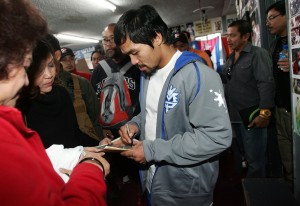From theater, the unexpected

I did not expect to look forward to this week’s fourth match between Filipino Manny Pacquiao and Mexican Juan Manuel Marquez. I submitted my credential request, booked my flight to Las Vegas and reserved my hotel room for Dec. 8 under a spell of grim determination, not euphoria; this would make a tetralogy of the rivalry for which this era of prizefighting will be remembered, and I should witness it if I am able. I am now excited, though, because of an unlikely source – the third episode of HBO’s “24/7” program – and its subversion of a usually reliable imperviousness to hype. We’ll return.
What is likeliest to happen Saturday is another close fight, but one Pacquiao rightfully wins with hustle, followed by a set of scorecards that give Marquez a comfortable decision. Pacquiao has lost his novelty in Las Vegas, and while Marquez ever had little, the Mexican has at least gone to the trouble of reengineering his body in a Vegas-like way, erecting in just 15 months a breathtaking spectacle nature will raze in five years (or at least by the time Marquez arrrives in Canastota). That and previous scoring shenanigans make Marquez, for once, a more appealing figure in Las Vegas than Pacquiao.
In his exhaustive reevaluation of art history, British writer Paul Johnson opines of this week’s host city: “Nothing in Las Vegas is built to last except the roulette wheels. It is a city which, architecturally, is always in the immediate present, never in the past or future. It is Ephemeropolis.” In Johnson’s sense, neither Pacquiao nor Marquez is very much an Ephemeropolis fighter. Both have, in their ways, endeavored to be more permanent figures than Las Vegas generally appreciates; their careers cannot be divided in chapters named after trainers the way Oscar De La Hoya’s can be, they haven’t the shamelessness or salesmanship of American heavyweights, and they both lack Floyd Mayweather’s capacity for reinvention. Both are for the most part beneficiaries of a meritocracy, and while each now comes to the logical ends of his meriting millions of dollars to fight, both have, with very few exceptions, deserved the fortunes they’ve amassed as entertainers who combat honestly the men put in front of them.
If you did not see Saturday’s episode of HBO’s “24/7” program, if after the preceding week’s absurd Filipino donut-vending and Mexican jumpy-jump partying, you vowed never to watch another moment of the “24/7” franchise, you are, of course, forgiven, though also surprisingly unfortunate. Saturday’s episode was an unpredicted return to what camp footage made the series’ 2007 introduction compelling. It wasn’t choreographed handpad tricks and portentous stretching, either, but actual punching in combination, with the camera acting more as reporter than novelist.
Saturday’s episode did an uncharacteristically good job of examining the relationships between the fighters and their monkish trainers, with Freddie Roach admitting and then recanting that Pacquiao has become the boss of his camps, a degree of control, one can extrapolate, inversely proportionate to the quality of Pacquiao’s fighting since his 2009 stoppage of Miguel Cotto. More interesting still was a very short clip of Nacho Beristain giving Marquez, whom Beristain has trained for more than 20 years and made this generation’s master of efficient motion, a direct instruction:
“Throw right uppercut, hook, straight right,” Beristain said, and then he raised his finger as an instructor. “But parallel, Juan, the shoulders, principally (when throwing) the hook.”
There was no question who was the boss so long as Marquez wore gloves, a supplicant position in which Marquez voluntarily and fully places himself and Pacquiao once did more than he does today. Roach, by episode’s end, committed to restoring balance in his gym, but one could see Pacquiao’s annoyance with interruptions of his private rhythm and strategizing. Roach, in an enthusiastic pursuit of wealth and celebrity, has seen his relationship with Pacquiao revised while taking on charges like Julio Cesar Chavez Jr., unwilling to submit long to privation, and Amir Khan, unable to succeed with any punch-to-hurt curriculum, such that aficionados, and Roach himself, now openly question Roach’s primacy among trainers.
While there is little doubt Roach understands what Pacquiao must do to beat Marquez well as Beristain does, there does not appear a same technical fluency between Roach and Pacquiao as between Beristain and Marquez. Some of that is inevitable, with Roach and Pacquiao not sharing a native language like Beristain and Marquez do, but much of it is this: Roach did not teach Pacquiao how to box; he took a physical prodigy and improved him. Beristain, conversely, can query from his mind’s database the exact image of a teenage Marquez learning where to put his feet on the blue mat, and phrase precisely a problem whose solving will have Marquez position Marquez how Beristain wishes him.
Expect little new from either man Saturday. Though Pacquiao’s reflexes and conditioning will not be what they were in 2009 they will remain superior enough to outbusy Marquez if he so chooses, and that is Pacquiao’s best way of winning a third decision, on an objective scorecard. Marquez will be exactly what he was in fights I, II and III, and if he repeats his performance from 13 months ago, it says here, he’ll win comfortably on official scorecards. The only possibility for novelty this match holds is if Marquez, now physically enhanced enough to redden all faces at the Nevada State Athletic Commission, hurts Pacquiao. There is no better closer in boxing than Marquez – and a tetralogy that ended with Pacquiao felled thrice would be historic in its symmetry first of all.
That is too unlikely. So I’ll take Pacquiao, this time, in a fight the judges score for Marquez.
Bart Barry can be reached at bart.barrys.email (at) gmail.com.